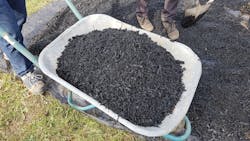FFAR grant to optimize wastewater biochar production
The Foundation for Food & Agriculture Research (FFAR) is awarding a $330,256 grant to the Rich Earth Institute to produce biochar from wastewater material.
The FFAR funding comes from its Seeding Solutions grant program. Cornell University, Cornell Cooperative Extension of Suffolk County, the Rich Earth Institute and the University of Michigan provided matching funds for a total $660,517 investment.
A significant portion of regional fertilizer needs could be met by reclaiming the nutrients present in wastewater — domestic, industrial, or stormwater sewage. The biochar involved in this project could be used to develop safe, renewable fertilizers that enhance agricultural productivity, support soil health, reduce nutrient pollution and mitigate climate change through soil carbon sequestration.
“The research will examine this biochar-based fertilizer’s ability to improve soil health, increase carbon sequestration and restore damaged soil,” said LaKisha Odom, FFAR scientific program director. “Ultimately, if successful, wastewater-derived fertilizer can reduce fertilizer runoff and reduce costs for growers.”
Fertilizer production contributes to greenhouse gas (GHG) emissions, and runoff from fields can cause pollution. Rising fertilizer prices also put financial pressure on farmers. Furthermore, international conflict is disrupting supply chains, making fertilizer availability and price inconsistent.
Wastewater biosolids, produced during the wastewater treatment process, are rich in organic matter and nutrients that can be used as fertilizer. Yet, these biosolids often contain micropollutants including per- and polyfluoroalkyl substances (PFAS) from industrial processes, personal care products and many other sources. As a result, wastewater biosolids are often sent to landfills, where they produce GHGs. However, the amount of micropollutants can be greatly reduced by transforming biosolids into biochar, which can also be used as fertilizer, although the production process causes a loss of nutritional value.
Researchers led by Abraham Noe-Hays, research director at the Rich Earth Institute, are studying a variety of techniques to optimize the wastewater biochar production process to reduce the amount of micropollutants in the biochar while retaining nutrients. Additionally, they are evaluating biochar’s ability to filter contaminants out of other nutrient-rich liquid waste streams by binding nutrients to produce fertilizers even richer in nitrogen and phosphorus.
Finally, the Rich Earth Institute is engaging with farmers, policymakers and other key stakeholders to identify core concerns, needs and recommendations relating to wastewater-derived fertilizer, after which they will co-create strategies to address these perspectives through education, policy and technical development.
